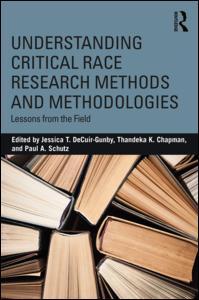Understanding Critical Race Research Methods and Methodologies Lessons from the Field
Coordonnateurs : DeCuir-Gunby Jessica T., Chapman Thandeka K., Schutz Paul A.

Despite the growing urgency for Critical Race Theory (CRT) in the field of education, the "how" of this theoretical framework can often be overlooked. This exciting edited collection presents different methods and methodologies, which are used by education researchers to investigate critical issues of racial justice in education from a CRT perspective. Featuring scholars from a range of disciplines, the chapters showcase how various researchers synthesize different methods?including qualitative, quantitative and mixed methods, and historical and archival research?with CRT to explore issues of equity and access in the field of education. Scholars discuss their current research approaches using CRT and present new models of conducting research within a CRT framework, offering a valuable contribution to ongoing methodological debates. Researchers across different levels of expertise will find the articulations of CRT and methods insightful and compelling.
Part I: Introduction Critical Race Theory, Racial Justice, And Education: Understanding Critical Race Research Methods and Methodologies. Part II: Critical Race Archival and Historical Analysis 2. Understanding the Why of Whiteness: Negrophobia, Segregation and, the Legacy of White Resistance to Black Education in Mississippi 3. CRT in Education: Historical/Archival Analyses 4. Can You Hear (and See) Me Now?: Race-ing American Language Variationist/Change and Sociolinguistic Research Methodologies Part III. Critical Race Qualitative Methods 5.A Match Made in Heaven: Tribal Critical Race Theory and Critical Indigenous Research Methodologies 6. Taking it to the streets: Critical Race Theory, Participatory Research and Social Justice 7. The Commitment to Break Rules: Critical Race Theory, Jazz Methodology and the Struggle for Justice in Education 8. Critical Race Perspectives on Narrative Research in Education: Centering Intersectionality 9. Not One, but Many: A CRT Research Team Approach to Investigate Student Experiences in Racially Diverse Settings 10. Bridging Theories to Name and Claim a Critical Race Feminista Methodology Part IV: Critical Race Quantitative and Mixed Methodologies 11.Quants & Crits: Using Numbers for Social Justice (Or, How Not to be Lied to With Statistics) 12. Expanding Educational Pipelines: Critical Race Quantitative Intersectionality as a Transactional Methodology 13. Critical Race Cartographies: Exploring Map-Making as Anti-Racist Praxis 14. Critical Race Mixed Methodology: Designing a Research Study Combining Critical Race Theory and Mixed Methods Research Part V: Future Directions in Critical Race Methods and Methodologies 15."Where Do We Go From Here?A Future Agenda for Understanding Critical Race Research Methods and Methodologies.
Jessica T. DeCuir-Gunby is Professor of Educational Psychology and University Faculty Scholar in the Teacher Education and Learning Sciences Department at NC State University.
Thandeka K. Chapman is Associate Professor in the Department of Education Studies at University of California, San Diego.
Paul A. Schutz is Professor in the Department of Educational Psychology at the University of Texas, San Antonio.
Date de parution : 12-2018
15.2x22.9 cm
Disponible chez l'éditeur (délai d'approvisionnement : 14 jours).
Prix indicatif 78,35 €
Ajouter au panierDate de parution : 12-2018
15.2x22.9 cm
Disponible chez l'éditeur (délai d'approvisionnement : 14 jours).
Prix indicatif 209,69 €
Ajouter au panierThème d’Understanding Critical Race Research Methods and... :
Mots-clés :
Young Men; critical race theory; East Side High School; mixed methods; Sustainable University Community Partnership; racial realism; Mixed Methods Researchers; racial justice; Chicana Feminist Epistemology; Transdisciplinary; Explanatory Sequential Mixed Methods Design; Experiential Knowledge; CRT Research; Intercentricity; CRT Scholar; desegregation; CRT Methodology; southern education; Critical Race Praxis; oral history; CRT Framework; historical narrative; Quantitative Research; black feminist theory; Racial Microaggressions; African American Language; Par Literature; AAL; Alameda Corridor; people of color; Residential Security Maps; POC; Chicana Feminist; intersectionality; CRT; intersectional theory; Mixed Methods Research; critical indigenous research methodology; Critical Race Theoretical Framework; storytelling; African American Vernacular English; counterstory; Educational Pipeline; scholar activist; Tribal IRBs; Participatory Action Research; Black Feminist Lens; PAR; Teacher Burnout; Black Education; social justice; jazz methodology; Justice-centered education; praxis; urban education; student voice; integration; LatCrt; Chicana; feminism; nepantla; spatial analysis; cartography; CRQI; trans-sectional; testimonio; GIS; geographic information systems; microaggression; data integration; Thandeka K; Chapman; Paul A; Schutz; Jamel K; Donnor; Jerome E; Morris; Benjamin D; Parker; Sonja L; Lanehart; Bryan McKinley; Jones Brayboy; Jeremiah Chin; Adrienne D; Dixson; ArCasia James; Brittany L; Frieson; David Stovall; Theodorea Regina Berry; Elizabeth J; Bowers Cook; Nicholas D; Hartlep; May Vang; Talonda Lipsey-Brown; Tatiana Joseph; Dolores Delgado Bernal; Lindsay Pérez Huber; María C; Malagn; Claire E; Crawford; Sean Demack; David Gillborn; Paul Warmington; Alejandro Covarrubias; Pedro E; Nava; Argelia Lara; Rebeca Burciaga; Daniel G; Solrzano; Vernica N; Vélez



